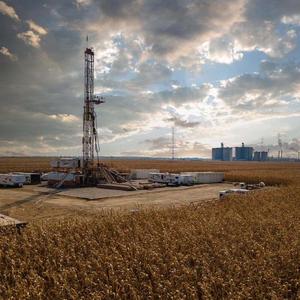Marquis plans soybean crushing facility, CCS, biobased chemicals

Marquis Inc.
October 4, 2021
BY Marquis Inc.
Marquis Inc. CEO Mark Marquis has announced a plan for the Marquis Industrial Park to include a soybean crushing facility, biobased chemicals and on-site carbon injection. Last week Marquis began drilling its first 5,000-foot test well to determine the total capacity available for carbon sequestration in the Mt. Simon Sandstone on its site. The Marquis Family will begin immediate development of the first of two 600 ton per day blue hydrogen and blue ammonia facilities, as well as manufacturing for carbon neutral biobased chemicals and plastics.
The Marquis Industrial Park in Hennepin, Illinois, is a 2500-acre industrial site with multiple natural gas lines, access to the electrical transmission grid, year-round river barge loading, interstate highway, and Class 1 railroad. In addition to the blue hydrogen and blue ammonia project, the plan includes a state-of-the-art soybean crushing facility to produce biobased feedstocks for the production of renewable diesel and sustainable aviation fuels.
Marquis commented, “I am excited about low-carbon solutions to the climate crisis however our government has failed to recognize ethanol’s value as part of the climate crisis solution. As a result, my family may reduce our exposure to the fuel-grade ethanol business.
Recently President Biden issued an executive order aiming to make half of all new cars and light duty trucks sold in 2030 electric vehicles. In addition, the Trump Administration failed to support the Renewable Fuel Standard through the excessive issuance of Small Refinery Exemptions and the Biden Administration is considering reductions in the Renewable Volume Obligations.”
Advertisement
For further information on the carbon injection project at the Marquis Industrial Park please visit www.marquisincorporated.com.
Advertisement
Related Stories
CoBank’s latest quarterly research report, released July 10, highlights current uncertainty around the implementation of three biofuel policies, RFS RVOs, small refinery exemptions (SREs) and the 45Z clean fuels production tax credit.
The U.S. Energy Information Administration maintained its forecast for 2025 and 2026 biodiesel, renewable diesel and sustainable aviation fuel (SAF) production in its latest Short-Term Energy Outlook, released July 8.
XCF Global Inc. on July 10 shared its strategic plan to invest close to $1 billion in developing a network of SAF production facilities, expanding its U.S. footprint, and advancing its international growth strategy.
U.S. fuel ethanol capacity fell slightly in April, while biodiesel and renewable diesel capacity held steady, according to data released by the U.S. EIA on June 30. Feedstock consumption was down when compared to the previous month.
XCF Global Inc. on July 8 provided a production update on its flagship New Rise Reno facility, underscoring that the plant has successfully produced SAF, renewable diesel, and renewable naphtha during its initial ramp-up.
Upcoming Events










